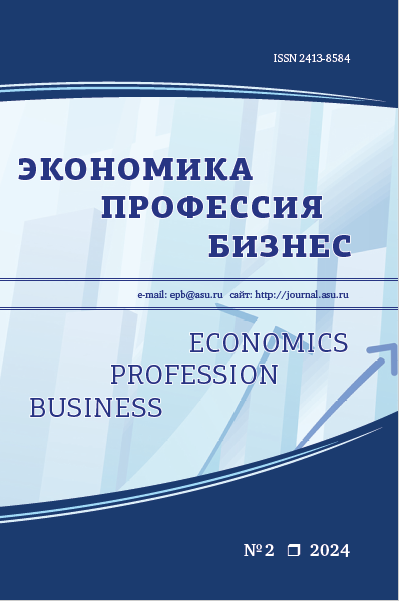METHODOLOGY FOR ASSESSING IMPORT DEPENDENCE OF PRODUCTION OF AN INDUSTRIAL ENTERPRISE
УДК 338.45
Abstract
In the modern realities of the Russian economy, the problem of assessing the import dependence of an industrial enterprise is of particular importance. The high level of import dependence in the context of the sanctions policy of Western countries creates a threat to the economic security of an economic entity. At the same time, the methodological aspects of analyzing import dependence at the micro level remain insufficiently studied.
The author has developed methodological tools for analyzing the import dependence of production at an industrial enterprise. In order to assess the degree of import dependence of production, it is proposed to use economic indicators — “import intensity of material resources”, “import intensity of fixed production assets”, “integral indicator of import intensity (import dependence) of production”. The article formulates a definition of the concept of import intensity of production of an industrial enterprise, presents an algorithm for calculating the integral indicator of import dependence of production and defines its criterion values.
The presented methodology can be used to assess the degree of import dependence of the output of both individual types of products and the enterprise as a whole.
Downloads
Metrics
References
Баранова Н. М., Ларин С. Н. Показатели оценки эффективности реализации отраслевых стратегий импортозамещения // Journal of Economy and Business. 2019. № 4. С. 25-31.
Моисеев Н. А., Ахмадеев Б. А. Алгоритм оценки импортозамещения на основе таблиц затрат-выпуска // Теория и практика управления. 2021. Том 18. № 3 (117). С. 117-129
Хейфец Б. А., Чернова В. Ю. Система оценки эффективности и мониторинга результатов политики импортозамещения // Экономика региона. 2019. Том 15. Вып. 4. С. 1266-1278.
Тихонова С. В. Оценка импортозависимости и эффективности политики импортозамещения в отечественном машиностроении // Московский экономический журнал. 2020. № 7. С. 182-191.
Матвеева Л. Г., Чернова О. А., Климук В. В. Оценка эффективности политики импортозамещения в промышленности: методический инструментарий // Известия ДВФУ. Экономика и управление. 2015. № 3. С. 3-13.
Батьковский А. М., Стяжкин А. Н., Хрусталёв О. Е. Инструментарий экспертной оценки импортной зависимости производства продукции // Научный журнал КубГАУ. 2017. № 133 (09). С. 1-23.
Жуков А. О., Карцан П. И. Определение степени импортозависимости биотехнологических организаций // Журнал прикладных исследований. 2022. С. 126-130.
Филипцов А. М., Горбатенко И. В. Импортоемкость производства и роль агропродовольственного сектора во внешней торговле Республики Беларусь // Белорусский экономический журнал. 2017. № 2 (79). С. 117-128.
Душенин А. И. Импортоемкость российской экономики в период 2014-2019 // Актуальные вопросы экономики и социологии. 2022. С. 45-48.
Стрижкова Л. А., Тишина Л. И., Селиванова М. В. Структурные сдвиги в экономике России и ее импортоемкости в 2014-2019 годах: анализ макроэкономической статистики // Вопросы статистики. 2021. № 28 (5). С. 5-27.
REFERENCES
Baranova N. M., Larin S. N. Indicators for assessing the effectiveness of implementing industry-wide import substitution strategies. Journal of Economy and Business. 2019. No. 4. Pp. 25-31.
Moiseev N. A., Akhmadeev B. A. Algorithm for assessing import substitution based on input-output tables. Theory and practice of management. 2021. Volume 18. No. 3 (117). Pp. 117-129.
Kheifets B. A., Chernova V. Yu. System for assessing the effectiveness and monitoring the results of the import substitution policy. Regional Economics. 2019. Volume 15. Issue 4. Pp. 1266-1278.
Tikhonova S. V. Assessing import dependence and the effectiveness of import substitution policies in domestic mechanical engineering. Moscow Economic Journal. 2020. No. 7. Pp. 182-191.
Matveeva L. G., Chernova O. A., Klimuk V. V. Assessing the effectiveness of import substitution policy in industry: methodological tools. News of the Far Eastern Federal University. Economics and Management. 2015. No. 3. Pp. 3-13.
Batkovsky A. M., Styazhkin A. N., Khrustalev O. E. Tools for expert assessment of import dependence of production. Scientific journal of KubSAU. 2017. No. 133 (09). Pp. 1-23.
Zhukov A. O., Kartsan P. I. Determining the degree of import dependence of biotechnological organizations. Journal of Applied Research. 2022. Pp. 126-130.
Filiptsov A. M., Gorbatenko I. V. Import intensity of production and the role of the agri-food sector in foreign trade of the Republic of Belarus. Belarusian Economic Journal. 2017. No. 2 (79). Pp. 117-128.
Dushenin A. I. Import intensity of the Russian economy in the period 2014-2019. Current issues of economics and sociology. 2022. Pp. 45-48.
Strizhkova L. A., Tishina L. I., Selivanova M. V. Structural shifts in the Russian economy and its import intensity in 2014-2019: analysis of macroeconomic statistics. Questions of Statistics. 2021. 28 (5). Pp. 5-27.
Economics Profession Business is a golden publisher, as we allow self-archiving, but most importantly we are fully transparent about your rights.
Authors may present and discuss their findings ahead of publication: at biological or scientific conferences, on preprint servers, in public databases, and in blogs, wikis, tweets, and other informal communication channels.
Economics Profession Business (EPB) allows authors to deposit manuscripts (currently under review or those for intended submission to EPB) in non-commercial, pre-print servers such as ArXiv.
Authors who publish with this journal agree to the following terms:
- Authors retain copyright and grant the journal right of first publication with the work simultaneously licensed under a Creative Commons Attribution License that allows others to share the work with an acknowledgement of the work's authorship and initial publication in this journal.
- Authors are able to enter into separate, additional contractual arrangements for the non-exclusive distribution of the journal's published version of the work (e.g., post it to an institutional repository or publish it in a book), with an acknowledgement of its initial publication in this journal.
- Authors are permitted and encouraged to post their work online (e.g., in institutional repositories or on their website) prior to and during the submission process, as it can lead to productive exchanges, as well as earlier and greater citation of published work (See The Effect of Open Access).









